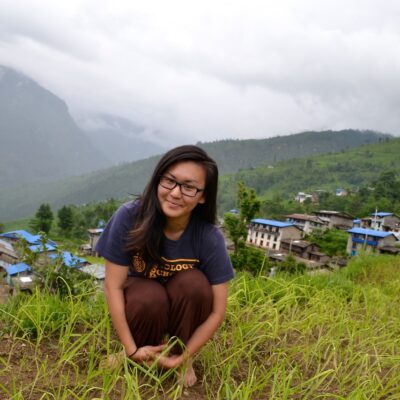Sikai Song Sciences
Indigenous Knowledge and Bio-efficacy of Medicinal Plant Use: An Ethnobotancial Study of Sindhupalchok, Nepal
Ethnobotany is defined as the scientific study of the traditional knowledge and customs of a people concerning plants and their medical, religious, and other uses. Given that many active compounds used in pharmaceutical drugs today are extracted from plants, understanding indigenous knowledge regarding medicinal plant use is invaluable to deepen existing knowledge regarding various pharmacological uses of high-value medicinal plants, conservation, and sustainable resource management. My research seeks to document and catalogue the high-value medicinal plants used by the Tamang people in remote villages in rural Sindhupalchok, Nepal, as well as assess the bio-efficacy of the medicinal plants by comparing indigenous use with reported phytochemical and pharmacological properties in literature.
Scholars Journal
June 7th, 2013 The first thing I notice about any place is the smell. Nepal smells like earth. Inside, outside, it doesnt matter. It is monsoon season right now, so it will rain almost every day for the next three months. Its warm and humid, and if you dont mind being a little wet, a jacket is not necessary. The thought of starting my research terrifies and excites me all at once. As a budding-reseacher, I am hungry to start and to find out new things, to uncover and document knowledge- but as a silly American girl, I am scared of failure. I am afraid I will sooner discover my limits than my potential. June 15th, 2013 The past week has mostly been reading, putting together a brief-literature review of the ethnobotany thats already been documented of the Tamang people in Nepal. In two days, I leave to the rural village in Sindhupalchok where I will finally begin my research: nearly 6-9 hours of interviews every day, field observations, and focus group discussions everyday for about 2 weeks, and then back to Kathmandu for a few weeks to re-collect and organize my data, and then back to Sindhupalchok. I wonder if life is fast or slow, how different it will be out in the country side than in the city. I wonder if the people laugh easily or if they are too tired to smile by the end of the day. July 2nd, 2013 The past two weeks in Bhotang VDC, Sindhupalchok was incredible. I was able to meet and interview with so many local healers, collectors, health workers, and local villagers, with probably at least 25+ hours of interviews to transcribe, organize, and analyze. Living with the villagers, eating the food, and trying to adjust myself to the every day lifestyle helps because I think it helps make the others around me feel more comfortable with my presence and more willing to share their knowledge with me. I have been very conscious and wary of not imposing myself upon people, to be as respectful as I can. Im meeting up with one of the professors from the local university tomorrow to figure out what to do next. The most frustrating thing has been this uncertainty period of not knowing which step to take next- like waiting for other people to reply back to your emails. July 26th, 2013 Ive been cafe-hopping all day today because I realize that I cant work at all when Im at home. Still in Kathmandu, and trying to enjoy the last few weeks I have left here in Nepal. Im sitting in The Bakery Caf, one of my favorite places to eat here. Ive been communicating with a local professor who is absolutely amazing and extremely helpful with guiding me through the next steps of my research. I have less than a week left before I head back to Bhotang village (4 hour bus ride + 7 hour intense trekking/hiking up the mountain) next week, and this time, I am determined to do this the best that I can, to do it better than I did the first time. Having already gone and experienced life in the village, I am much better prepared physically, mentally, and intellectually for this. August 17th, 2013 My research is nearly complete (at least, for the time being)! After spending another 10 days in Sindhupalchok again re-collecting all the plants from near the village in Bhotang VDC, dutifully pressing the plants every night for about a week, painstakingly conducting 6-7 hours of interviews for about 5 days- my advisor here says its enough and I can submit my collection to the local herbarium. I think around 60% of the plants are identified, while the rest are unsure/unknown. More than anything, the past 3 months have been a roller-coaster ride. I came here to conduct research, and ended up discovering more about myself than anything. All of my experiences have given me a new outlook on life, research, education, and goals in life. Im going to miss Nepal.